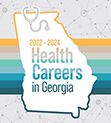Pathway to Med School
APPLY ONLINE NOW | 2024 BROCHURE DOWNLOAD
SOWEGA-AHEC, in collaboration with Albany Area Primary Health Care (AAPHC) and Phoebe Family Medicine Residency Program, created the Pathway to Med School Program to address the critical need for primary care physicians in Southwest Georgia. Knowing that students from rural communities are more likely to return to a rural area to practice and understanding the need to increase the pipeline of rural students enrolled in Georgia medical schools, it was determined that students from the 38-county region needed to become more competitive in the application process.
To determine how to make the students more competitive, AHEC polled the admissions committees from each of the medical schools in Georgia to determine what beyond MCAT scores and GPA would increase their chances of being accepted. The overwhelming consensus was a much needed and significant structured clinical shadowing and medical research experience. The Albany based Pathway to Med School Program was structured accordingly as a 4-week residential experience to include 200 hours of clinical, research, and didactic experience.
Southwest Georgia is a medically underserved area (MUA) and by supporting the efforts of local aspiring medical students at the pre-med academic level we can improve access to healthcare in our communities.
Eligibility Requirements
- Be at least a rising college sophomore working on a pre-med curriculum
- Have a minimum 3.0 GPA in science/math courses and an overall 3.0 GPA.
- Be a legal Georgia resident and U.S. citizen enrolled in an accredited Georgia college or university at the application deadline. Pending citizenship or Green Card Visa holders are not eligible.
- Submit an application that includes a 500–word essay entitled, “Why I’m Interested in Serving Rural Populations as a Primary Care Physician.”
- Submit and ensure official transcript* RECEIVED by the deadline.
- Be able to attend the entire program from start to finish, no exceptions granted.
- Have reliable transportation during the entire 4- or 5-week program.
- Disqualification will occur if student applies to more than one Georgia PTMS program in a calendar year. (Applications are cross-referenced between AHEC regions).
*Please note: A copy of the student’s official transcript is required to complete the PTMS application. Official transcripts are only accepted directly from the college or university and must arrive for validation to SOWEGA-AHEC by the deadline date and time. The student is responsible for initiating and confirming the delivery. Be advised that this process can take up to 3 weeks for some schools.
Program Components
200 hours of clinical, research and didactic experience for 10 participants include:
- 50% devoted to clinical shadowing with primary care doctors in healthcare facilities with real patients;
- 40% devoted to research where data collection, interpretation, and presentation is expected;
- 10% devoted to seminars, a campus tour, the Admissions Forum and Mock Interviews.
Program Dates:
May 20 – June 21
- February 9, 2024: Application deadline including receipt of official transcript
- March 31, 2024: Notice of Acceptance
- May 20, 2024: Students move into housing, if applicable
- May 20, 2024: Ice Breaker Social Event
- May 20, 2024: Orientation
- June 10, 2024: Sim Lab Tour
- June 11, 2024: Mock Interviews
- June 12, 2024: Annual Admissions Forum
- TBD: Medical School Campus Tour
- June 21, 2024: Graduation & Move Out Day
- October 2024: GAFP Spring Conclave
More Information
What is Primary Care?
Primary Care is the delivery of healthcare from physicians who have a broad training of medical issues for treatment for populations across the entire human lifespan, from pre-conception to natural death of the elderly. The Primary Care physician is the “first degree” access to medical care for the average person. One could say that it operates on the “front lines” of the delivery of healthcare. The Primary Care approach to the delivery of medical services allows for the familiarity between a doctor and a patient to exist as a continuous basis.
Application Information
The application is available on-line from the first week in January until the beginning of March each calendar year. Selected candidates will be notified within the first week of April. A total of 10 students are selected for participation.
Students who feel they meet the eligibility requirements outlined and are interested in what this program has to offer are invited to complete an ON-LINE APPLICATION and have an Official Transcript sent to info@sowega-ahec.org or mailed to SOWEGA-AHEC | 1512 W 3rd Avenue | Albany, GA 31707 | Attn: Special Projects Coordinator.
The Pathway to Med School Program has existed in Georgia since 2004. Since then, 688 students have applied and 137 have been accepted into the program and have successfully completed the entire program. Of those, 92% have successfully applied to and have been accepted into medical school. This program yields results that are helping our community. You are invited to be a part of this dynamic adventure in delivering healthcare to people who really need your skills.

